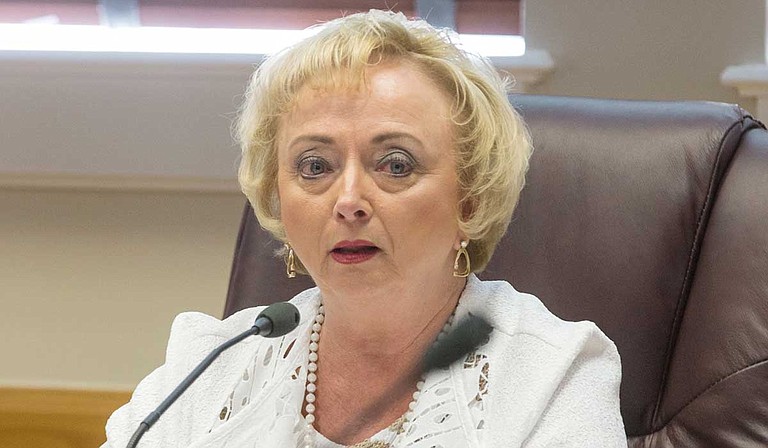Local superintendents, including State Superintendent Carey Wright, discovered an error in the Mississippi Department of Educations count of teachers, which led to the Legislature appropriating an inaccurate amount of money for teacher pay raises. Photo by Imani Khayyam.
Friday, April 26, 2019
JACKSON, Miss. (AP) — State officials said Wednesday that they'll make up a $10 million to $15 million shortfall in funding for teacher raises of $1,500 apiece after the Mississippi Department of Education miscounted the number of eligible teachers.
Local superintendents discovered the error Tuesday when the department sent financial documents to districts. In the 4,300-student Pearl district, for example, Superintendent Ray Morgigno said Wednesday that documents showed raises had been provided for 59 fewer employees than Pearl had anticipated. That translated to a projected $109,000 shortfall in a district that has a $38 million budget this year.
"We were like 'Oh my gosh,'" Morgigno said.
Ronnie McGehee, executive director of the Mississippi Association of School Administrators, said he's gotten multiple other emails, with many districts finding, like Pearl did, that 20 percent or more of licensed teachers didn't seem to be accounted for.
With teacher groups and Democrats already savaging majority Republicans in an election year for what they say is a paltry raise, Republicans pledged quickly that they would cover any shortfall. Outgoing Gov. Phil Bryant and others said a special legislative session shouldn't be necessary, saying teachers can be paid on schedule starting July 1 and lawmakers can add more money in 2020 when the new Legislature meets after elections.
"The taxpayers of Mississippi should not have to fund a special session because of a mistake made the Mississippi Department of Education," Bryant said in a statement. "MDE should identify any other funds that can be used to pay for the raises not accounted for in the original funding, and the Legislature can refund that source through a deficit appropriation in January."
Both outgoing Lt. Gov. Tate Reeves, a Republican running for governor, and House Speaker Philip Gunn, a Clinton Republican who wants to return to his post, also said lawmakers should cover any shortfall, so districts don't have to use their own money.
The problem stems from the department's count of how many teachers were eligible, as documented in a March 27 letter counting 31,157 teachers. Department spokeswoman Patrice Guilfoyle said employees arrived at that number by totaling teachers who are classified as being paid only with funds from the Mississippi Adequate Education Program, the formula that divvies up state aid to school districts. The idea was to omit teachers paid with federal funds, which will be used to cover their raises. But the department appears to have omitted some or all special education teachers, gifted teachers and career technical education teachers who are listed under different classifications. Many of those teachers are paid, at least in part, with state money.
Guilfoyle said the department is asking districts to report shortfalls, saying the department will compile them.
"We will provide this information to lawmakers and work with them to obtain the additional funding for the pay raise," she said in a statement.
Department administrators told lawmakers during the early part of the session that a $1,000 pay raise would cost just more than $50 million. But the new count allowed them to revise costs down, helping Republican leaders boost the amount to $1,500 for what they thought would be $58 million.
"They came back with a lower number," said Senate Appropriations Committee Chairman Buck Clarke, a Hollandale Republican who's running for state treasurer.
The new information suggests the original estimate was closer to correct.
Clarke suggested he and House Appropriations Committee Chairman John Read, a Gautier Republican, could write what's called a "budget note." That's a letter lawmakers sometimes write to clarify their spending intentions. Clarke suggested lawmakers could instruct the Department of Education to forward money from its own appropriation to school districts until more money can be added, so districts can avoid a cash crunch.

Comments
Use the comment form below to begin a discussion about this content.
Sign in to comment
Or login with:
OpenID